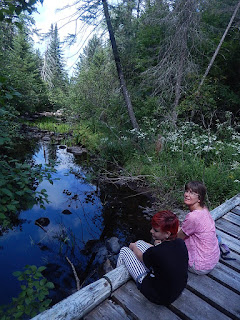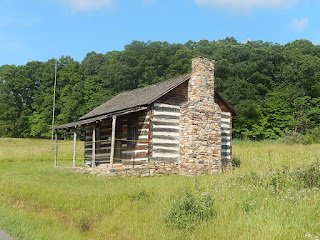By the time we had our talk,
relations had regained their suppleness.
Monday was a blowout. When I
picked Katya (Kat) up from seeing Suicide
Squad with two girlfriends, as I trusted, I looked in the plate glass
window of the theater to see her bending over kissing a seated boy, who was
wearing neon green—frogman (let’s call him).
“You are in big trouble,” I said unsubtly. Later she confessed that when she heard me
say that she thought of the children’s book Countdown
to Kindergarten with the little girl’s running refrain—“I am in big
trouble”—because the first day of school is coming and she doesn’t know how to
tie her shoes. Kat may be fourteen, but
she is still my baby, and frogman is seventeen and drives! Yes, she was in big trouble. After a night of screaming, cutting, and
threatening, the upset subsided into days of suspicion and disappointment
until, to make peace and preserve my relationship with her, I offered a possible
way that she might see frogman. The
proposal was no sooner out of my mouth than she texted it to him and her mind
turned to wedding dresses—mine of all things.
And funnily enough, Friday of this week from hell was my seventeenth
wedding anniversary. “It’s probably
yellow by now, huh?” “Maybe not. It’s folded up in a pillowcase somewhere
upstairs. I’ll see if I can find
it.” I was quite surprised that she
would care about my wedding dress, especially since she seems to know that my
marriage has been less than ideal. At
dinner that night (to celebrate), we were also working hard to make light of
the heaviness that was past, and it was fun to re-tell the way Frogman’s Flint-tough
mother showed up to scream at me for implying that her son was wrong to sneak
off to the movies with a young girl. “I
know why she was so upset,” I said. “The
17-14 age difference potentially makes what he did illegal—statutory rape … if
anything happened.” My daughter’s face
turned serious before she popped the question.
“Mom,” she began, “I was going to ask you earlier what would be
okay.” I knew at once what “what” she
meant: what level of physical contact
would be permissible? I almost
choked. “But we can talk about it
later,” she added, glancing at my husband, who clearly had no clue what she was
asking.
Later came sooner than I was ready
for. But when would I be ready? She settled down into the red armchair in my
office, facing windows open to the night air.
With little premeditation, I told her things that I hope she remembers like
she remembers what I said about kissing one day driving home from
school—“everything depends on the playfulness of your mouth.” She loved that and has brought it up many
times since. “The thing about sex,”
begins Mary Jo (not Mom), “is that it is too easy to get caught up, swept along
from kissing to touching to sucking to oral to vaginal … you get the idea. But if you get to the end of the story too
quickly, there is no more mystery (even though when done right the ride is
different each time). So you don’t want
the story to end too soon; you must take time to savor each chapter or, better
yet, each word. It would be fine to hold
hands, to hold him … for days, weeks, years.
Let the boy’s ‘vegetable love grow vaster than empires and more slow.’” Oh, no, I didn’t really say that. That is Andrew Marvell’s seduction line from
“To His Coy Mistress.” But I did say,
“let the feelings grow,” and I was thinking about Juliet’s metaphor ‘this bud
of love may prove a beauteous flower when next we meet.’ “Because here’s the truth about sex: excitement is a mystery that has as much to
do with the mind and the feelings as it does with lips, breasts, and
genitals. If you can’t kiss a boy for a
year, then maybe he isn’t playful enough or creative enough. Test him.
See if you feel comfortable showing yourself, expressing your self in
words, in smiles, in gestures. Sex is a
language or a dance that involves the whole person. See if he wants all of you before you give
away the parts.” I said these kinds of
things, derived from all the bad experiences, half-lived dreams, and still
undiscovered country that exists for me somewhere over the rainbow. I, too, am young in this.
But there was a lot that I didn’t
say and, perhaps, should have said. Today
I feel all those unsaid words jostling around inside me as I sit in the
bleachers of Mt. Morris High School
waiting for her team, the Kearsley Hornets, to play again. “That’s my girl,” I say to Stacia’s mom and
every time my girl serves, my eyes tear up.
She didn’t get to play the first round, and I felt dispirited but tried
hard not to let my face register the disappointment. At such times, I feel her feelings, smart at
her rejection. At these times, I feel
like we share a body—that mine is not mine alone and hers is not hers
alone. After I shared my thoughts with
her about boys and sex, I wanted to say something that perhaps doesn’t make
sense or wouldn’t have been helpful to her:
“Remember: our bodies are not our own.”
This may seem counterintuitive and a far cry from the liberal feminist
emphasis on a “woman’s right to choose” what’s good for her own body. But I am, first and foremost, a
Shakespearean; and the self-fashioning credo sounds dangerously close to Iago’s
belief that “our bodies are our gardens, to the which our wills are
gardeners.” Iago, for those of you who
don’t know, is devious, plotting, self-interested, jealous: the snake in Othello’s
paradise. Shakespeare is consistent
across all the plays: the villains never
feel the “deity” in their “bosoms” called soul or conscience, only the humble
characters (the murderers and slaves) hear their consciences accuse them when
they steal, swear, lie with their neighbor’s wives, or even think to do such
things. Any man that seeks to live well,
says one of the poor men hired by the evil Richard to kill brother Clarence,
must live without this “blushing shame-fac’d spirit.” All of Shakespeare’s simple men know that a
demanding immortal spirit dwells in each one of us.
I could have avoided Shakespeare and
employed the easy phrases—oft heard in Catholic schools—to make my point: “you are a temple of the Holy Ghost” or “you
are made in the image of God” or “we are parts of the body of Christ.” Even though these statements may be true,
they sound like church irrelevancies, abstracted from the texture of real
passion and real searching. Who am
I? How can love be wrong? Go girl, seek happy nights to happy days. Had I said these things to my daughter, she
would have rejected them, as you, reader, may be rejecting them, now. I could not then and cannot now rely on trite
Christian truisms, to gain her attention and move her to reflection, I have to
find words for real experiences. I
remember something that my little sister said a very long time ago. She was describing an early experience of
sexual shame: after going down on a guy in a casual hook up, she remembered
feeling that “the woods woundn’t look at [her] anymore.” I can recall countless moments of estrangement
after sex—the first and worst followed an anal rape when the unknown man
dropped me in the middle of Athens,
and I made it back to my hotel room where I cried, tucked into crisp white
sheets, too shocked to feel anything much except horrified numbness. Sex can render us faceless. We cover our faces quicker than our loins so
that our humiliation expressed in vacancy, disappointment, and deep sadness
doesn’t show. The deity leaves the
facial threshold to hide out in the depths of the body.
Disappointing sex proves better than
many other experiences that we have souls, and those souls play across faces involuntarily
if they are coaxed out, breathed out, shared delicately. Doctor Faustus (from Christopher Marlowe’s
play) was plagued by his soul because he could find no way to express it in the
external world of work or love. His
solution is to dispense with it; and, in a chilling scene, he attempts to sign
his soul away to Mephistopheles in exchange for twenty-four years of unlimited
power. As he tries to write the deed of
gift in blood, his own blood congeals.
Mephistopheles must fetch a brazier of coals from hell to get it flowing
again. Even more frightening is the
writing that appears on his arm—“Homo fuge!” (O man fly!). If we listen, our own bodies (like Faustus’)
tell us when we are desacralizing them, using them in ways that sever the
connective links with mysteries of spirit and cosmos. Faustus knows, as soon as he hands over the
deed, that he got the short end of the stick.
“Give me a wife,” he demands and gets a hot whore. Tell me about the stars, and Mephistopheles
hands him a book of diagrams. When he
asks to be initiated into the secrets of nature, he is directed to the same
book … as if a book could contain the experience of being alive and surprised
by joy and pain. At the limit of his
twenty-four years of power, Faustus seems to understand that he could not get
rid of the immortal part of him. He
wishes that he was a body without soul because then there would be some limit
to what he must suffer in hell.
How could I say all or any of this
to my fourteen-year-old daughter, who just wants to go out with frogman? Yet, my body insists on saying one more thing: a jock in a neon green shirt who continues to
fiddle with his phone, after being kissed by my beautiful blue-haired daughter
(nymph or naiad) wearing a fetching black camisole, is probably not be good
enough. Who could be good enough? No one this mother knows. Even if Kat and I never shared a body
literally (she is adopted), we share one now.
I held her, rocked her, spooned her while singing lullabies. When the dentist said, “open,” I opened my
mouth. When the doctor gave her a shot,
I flinched. When she got her ears
pierced, I squeezed her hand hard. And
when she sits on the bench in her first tournament at the beginning of her
freshman year in a new high school, my heart hurts. “That’s my girl,” I say proudly. She is worth her weight and more in joy, in
fun, in playfulness. And I want her to find
someone that helps her become her whole immortal self. “Hey, Mom,” she says to me today while
helping me clean up my school office in preparation for the start of school,
“wasn’t it weird seeing the other volleyball girls with their Moms.” Why?
“Well, they just kind of sat there, and they seemed distant …
mature. I’m glad I’m not mature.” It occurs to me that I was not alone
yesterday in feeling that we shared a body.
The simple explanation is that she is still dependent on me, but I
prefer to take the coincidence as proof that our bodies are not our own but
meant to be shared. And we must listen
oh so carefully to our fleshed selves as we struggle to share them only with
those who will wait for the monarch to appear on the balcony of the palace and
be graced by a smile that comes from God knows where.











